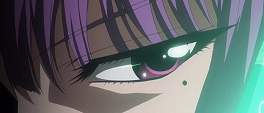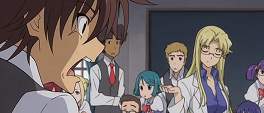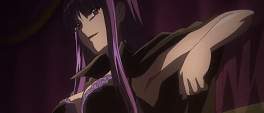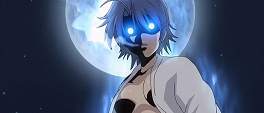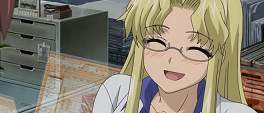Harry Potter can't be entirely to blame for the continuing creation of series based upon a school for adolescent magicians, but Ichiban Ushiro no Daimaou borrows a lot more from the ubiquitous boy wizard than can be easily overlooked. Thankfully the pilfering doesn't last beyond the opening ten minutes, from there the first three episodes are a maelstrom of raunchiness, magic, humour and insanity culminating in a one-versus-hundreds battle royale. Where the series will go from there is up for speculation as it ably demonstrates that, for better or worse, it is willing to discard common sense and narrative coherency to keep the humour flowing, the naughtiness frequent and pace quick.
Akuto certainly hasn't had an easy upbringing: left on a set of church steps when only a baby, he was brought up by the resident priests before swotting up and joining the Constant Academy for Magical Arts as a transfer student. On the train there he meets a fellow student, Junko Hattori, and become fast friends; that is until the prognosticating medical check-up demon predicts that Akuto would go on to become a much feared Demon King. Striking abject fear into the student body, he desperately tries to assure his peers that his intentions are far from demonic, however Junko is less than pleased with what she perceives as his deception and rebels against him. Akuto not only has to survive her onslaught but also the devious machinations of Fujiko Etou, the deadpan wit of the android Korone and the ebullient affections of Akuto's childhood friend, Keena Soga. In all probability he may not live long enough to see himself become the infamous Demon King.
The lewdness of the series comes almost entirely out of nowhere, a brief underskirt flash of a loin-cloth in the opening scene seems par for the course, however by the end of the first episode the chaste, blue-haired samurai has almost fully disrobed twice and there have been more groin-level, underwear exposing angles than can be written off as polite mistakes. The third episode sees the show sink further into deviance with masturbation, penis jokes and the finale: a lesbian orgy. Were it not all tied into the ongoing story and the inception of what are no doubt the series running jokes it would be almost too sordid to be justified, moving nonchalantly into the realm of pornography. Given the series composer, the bawdiness becomes understandable: working on the first two Ikkitousen series, both Queen's Blade series, both Sekirei series and the atrocious Mezzo series evidently left its mark on Takao Yoshioka; just how far this randiness will be taken after what has already been shown is quite the question.
The series' reliance upon generating increasingly outlandish situations to support the humour is to the detriment of its plotting. The first episode begins predictably enough with a loud, abrasive run-down of the key characters and motivations. It deviates quickly into randomness however with the third episode a cavalcade of non-sequiturs: after displaying only formative and catastrophic usage of magic, Akuto is suddenly able to defend himself and bend limbs with surprising competency; his fleeting visit to the dark side is then interrupted when a lynch mob is formed and an array of medieval weaponry is wielded in order to subdue him. This taking place after transforming a slavering demon dog into an adorable puppy and the seductive Fujiko lounging around in her frilly underwear for no discernible reason. That the series is willing to go to any lengths to maintain its comedy has a charming benevolence to it, and while best to expose this kind of tomfoolery early, the rapid shifts in tone and the landscape of characters could become tiresome.
Were one to see only the opening scenes, Ichiban Ushiro no Daimaou wouldcertainly be classed as a Studio DEEN production - the awkward body movements, washed-out visuals and tepid introduction bear all of their hallmarks; discovering this is an Artland production is, given their recent releases, unsurprising but still mildly disappointing after their peak with the resplendent Mushishi. The first three episodes of the series are a scattershot of different attempts at humour, most hit more than miss and although it uses its licentiousness to bolster that, both could swiftly outstay their welcome. Likely to end up in an entirely tangential place to where it started, the series is for now fun and frivolous which is a fine place to start.


